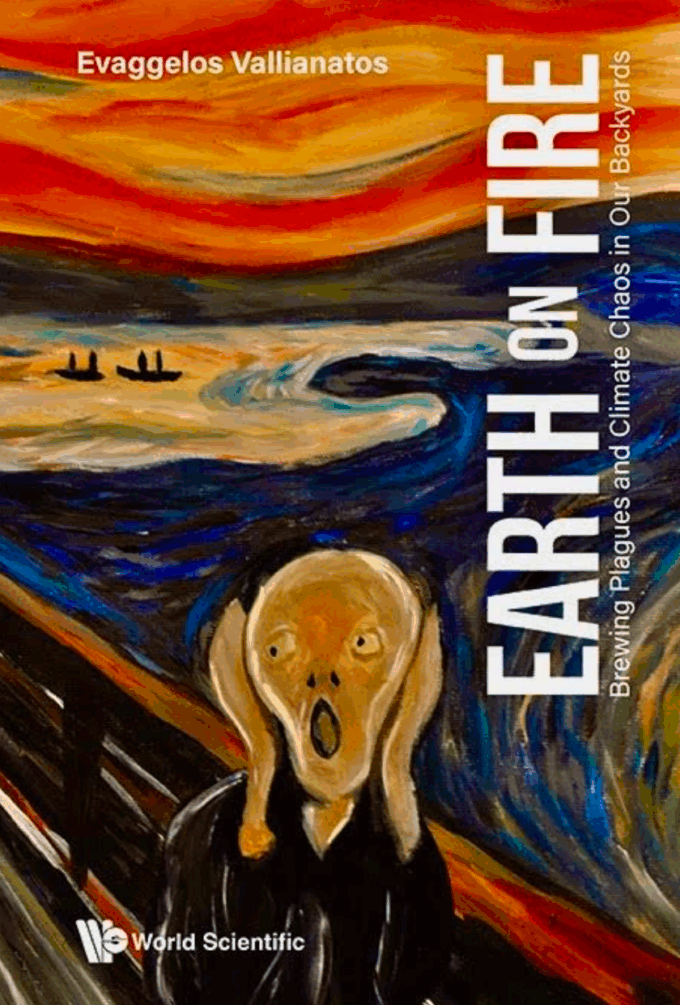
World War II America conserved petroleum / gasoline by urging Americans to share car driving. Poster printed by the Government Printing Office for the Office of Price Administration. Source: NARA. 1943. Public Domain
Petroleum is the fossil remnant of extremely ancient forests. Its discovery in mid-19th century sparked the rapid industrialization of Western Europe, Russia, Japan, America; the fueling of 2 World Wars, and the industrialization of India, China and the rest of the world.
More than any other factor, oil continues to fuel wars and, above all, triggers the cosmic warming emergency threatening civilization and the planet.
America’s oil wars
The latest example of America’s thirst for oil is Venezuela. Jeffrey Sachs, professor of economics at Columbia University and advisor of world leaders, reports this month that in the last 20 years the US has been trying to overthrow the government of Venezuela in order to grab the huge oil deposits of the country. “The calls by the US government,” says Sachs, “for escalation [against Venezuela] reflect a reckless disregard for Venezuela’s sovereignty, international law, and human life. A war against Venezuela would be a war that Americans do not want, against a country that has not threatened or attacked the US, and on legal grounds that would fail a first-year law student. Bombing vessels, ports, refineries, or soldiers is not a show of strength. It is the epitome of gangsterism.”
I would argue the same conditions of gangsterism prevail in the wars in Ukraine and Israel. The NATO allies keep arming Ukraine to keep killing its soldiers and Russian troops in a war Ukraine has already lost, but which could at any moment become nuclear war. The US has been the pillar of this hopeless slaughter. And incredibly enough, the European powers willfully ignore the slaughterhouse of the 2 World Wars fought primarily on their countries.
In Israel, biblical strategies guide the policies of Israel and its arms-supplier, America. Possessing nukes and relying on the inexhaustible armaments of America, Israel has been killing and starving mostly Palestinian civilians. Even the Islamic Arab neighbors of Israel remain silent and frozen by the war fighting of Israel in Lebanon, Iran and Syria. Jihadist Turkey has been barking at Israel, pretending to be the protector of Palestinians. Like the war in Ukraine, the war of Israel is endless and self-defeating. Instead, Israel could join Greece and together free Northern Cyprus from Turkish occupation. The result would be a union of Cyprus with Greece and a restauration of Greek national sovereignty in the Aegean and Eastern Mediterranean, which would make both Greece and Israel more secure. Jihadist Turkey threatens the entire Mediterranean. 
More floods, more heat, more suffering — everywhere
The petroleum wars take a different form in the countries not waging war. They become higher temperature for them and the entire planet. Despite the scientific evidence of more than a century, that burning petroleum, natural gas and coal raise the heat of the seasons, the large countries responsible for most of this heat, floods, and suffering ignore petroleum and global warming. Groups of scientists have appealed to US presidents to slow down the use of fossil fuels for the production of electricity, and the fueling of transportation, agriculture, home heating, and warfare. They pleaded with them not to allow drilling in federal lands and seas. But to no avail. Presidents talk only to billionaires. In addition, annual world meetings on “climate change” take place and presidents and prime ministers attend and promise to lessen the consumption of fossil fuels of their countries, only to return to their fossil fuel addiction. In each of these climate summits, Antonio Guterres, Secretary General of the United Nations, gives speeches in which he denounces fossil fuel companies and politicians for doing the bidding of the climate polluters. In desperation, he utters dire warnings of impending climate doom. However, in the opening of the climate summit in Belem, Brazil, November 7, 2025, Guterres was both encouraging and severe in his philosophical and political message to the world. He spoke about the “renewables revolution” and the dismal reality of 2025, global temperatures climbing from 1.5 to more than 2 degrees Celsius. He addressed the planet’s rulers, whom he honored with the title “Excellencies.” He said:
“President Lula da Silva,
Excellencies, Dear friends,
The global energy landscape is changing at lightning speed.
Last year, ninety per cent of new power capacity came from renewables. Global investment in clean energy reached two trillion US dollars – eight hundred billion more than fossil fuels. Renewables are now the cheapest source of new electricity in nearly every country. They are powering prosperity and empowering communities long left in the dark. Every dollar invested in renewables creates three times more jobs than a dollar invested in fossil fuels – and clean energy jobs now outnumber fossil fuel jobs worldwide. The renewables revolution is here. But we must go much faster – and ensure all nations share the benefits.
At COP28 [Conference of the Parties, United Arab Emirates, 2023], countries agreed to transition away from fossil fuels in a just, orderly and equitable manner; and to triple renewable energy capacity and double energy efficiency by 2030. The mandate is clear – now we must close the delivery gap.
And this, Excellencies, is where we are falling dangerously short.
Even if new national commitments are fully implemented, the world is still heading for clearly more than 2 degrees of warming.
That means more floods, more heat, more suffering – everywhere.
Scientists tell us that overshooting 1.5 degrees is now inevitable – starting at the latest, in the early 2030s…. To return below 1.5 degrees by century’s end, global emissions must fall by almost half by 2030, reach net zero by 2050, and go net negative afterwards.
So, what must we do? First, provide clarity and coherence: Align laws, policies and incentives with a just energy transition.
And eliminate fossil fuel subsidies that distort markets and lock us into the past. Second, put people and equity at the centre of the transition. Support workers and communities whose livelihoods still depend on coal, oil and gas. Provide training, protection and new opportunities – especially for young people and women. Third, invest in grids, storage, and efficiency. Renewables are surging, infrastructure must catch up – fast. Fourth, meet all new electricity demand with clean power…. And fifth, unlock finance at scale for developing countries…
Excellencies,
The pathways for each country may look different, but the destination must be the same:
A net-zero world, followed consistently by a net negative world – powered by renewables. We must support developing countries to implement their commitment to transition away from fossil fuels…
Let us move with speed and solidarity…
Turn climate necessity into development opportunity – everywhere.
The fossil fuel age is ending.
Clean energy is rising.
Let us make the transition fair, fast, and final.”
Guterres: on the footsteps of Plato and Aristotle
Guterres speaks the inconvenient truth, that enough with oil. Time is now to abolish the use of fossil fuels and replace them with renewable energy from the Sun and winds. He is a moral and political philosopher and lawgiver. He reminds me of Plato and Aristotle, who were the products of the fifth century BCE Peloponnesian War, a calamity for Greek civilization. And Guterres is a product of oil wars and climate chaos, not a small calamity for civilization and the planet.
Plato and Aristotle educated and warned the Greeks that the Peloponnesian War was not an aberration. Plato’s dialogues, especially The Republic, painted a canvas of a new polis of potential perfection where philosophers were kings without private property. Justice (δικαιοσύνη) and other virtues would rule the new polis. Plato even banned poets from his imaginary polis, while raising the prospect of life after death, for the rewards and punishments of the virtues and crimes of people. This Platonic life after death is much stronger than the shadowy Hades / Hell of Homer. Christians grabbed Plato’s life after death, making it a popular strategy for bringing destitute people to their religion.
Plato’s pupil, Aristotle, had his own way of informing the Greeks. He, too, was afraid the Greeks would repeat the catastrophe of the Peloponnesian War. He focused on how humans sought the truth and, in the process, he invented science. Then he tutored Alexander, destined to become Alexander the Great. He urged the young prince to unite the Greeks and remove the Persian danger. Alexander absorbed the thought of Aristotle and created an ecumenical age where Greek learning and thought spread the world over.
The legacy of Plato and Aristotle shaped the world. However, monotheism wrecked Greece and diluted Greek civilization, while the Greek idea of democracy was subverted by monarchies and oligarchies. They decorate themselves with indirect democracy.
Thus despite Plato and Aristotle, industrialists triumphed. Guterres knows his beautiful speeches talk primarily to the winds.
Epilogue
Guterres is right. Renewable energy is rising. But then global temperature is also rising. Doing nothing is suicidal. Scientists, environmentalists and people who respect themselves and science must unite – in America and the world over. They must demand and see to it that fossil fuels remain in the ground. Their struggle will include all those who have developed and use and support renewable energy.
States like California can convert petroleum-powered transportation to renewables-powered cars, trains, aircraft, and an expanded free public transport. The federal 1943 poster can be reissued, urging citizens to avoid driving private cars and join carpools and busses and trains. The poster could say that when you drive ALONE, you drive with a petroleum company executive. Second, California can transform its petroleum and toxic pesticides-addicted agriculture to organic farming. California can lead this struggle for a livable future.
The stakes of this struggle could not be higher. The fate of civilization and that of Mother Earth are on the line.
The post Oil Politics: Wars, More Floods, More Heat and Suffering — Everywhere appeared first on CounterPunch.org.
From CounterPunch.org via this RSS feed


